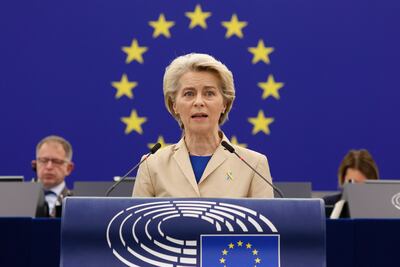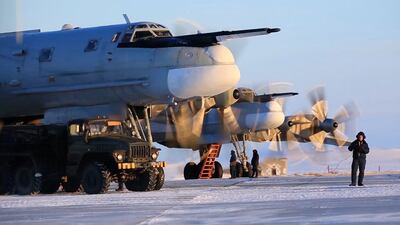The EU's executive arm has proposed new sanctions on Russia's “war machine” that would cut off access to military equipment and target Iran's drone producers over the war in Ukraine.
European Commission chief Ursula von der Leyen said she hoped the EU's 27 member states would agree to the new €11 billion ($11.8 billion) package, which would “ban all tech products found on the battlefield”, as part of a joint battery of G7 sanctions on the one-year anniversary of the invasion on February 24.
She said the package specifically seeks to deprive Russia of military equipment it needs and cannot get anywhere else. It includes proposals to subject seven Iranian entities to sanctions to try to prevent Russia from using their drones to hit Ukrainian civilian infrastructure. “We are weakening Russia's ability to maintain its war machine,” she said.
Russia is amassing aircraft close to the border with Ukraine, according to western intelligence that says Moscow may be preparing to dedicate jets and helicopters to the fight to turn the tide decisively in its favour.
Russia battered Ukraine with multiple missile strikes on Thursday as its troops sought to advance in the east, Kyiv said. Following a pattern of heavy aerial bombardment at times of Ukrainian battlefield or diplomatic advances, Russia launched 32 missiles in the early hours, Ukraine's Air Force said.
Bolstered by tens of thousands of reservists, Russia has intensified ground attacks across southern and eastern Ukraine in recent weeks, and a major new offensive appears to be looming as the first anniversary of its February 24 invasion nears.
It wants full control of the Donbas region and its current focus is on taking the small city of Bakhmut in Donetsk.
Bakhmut's capture would give Russia a stepping stone to advance on two bigger cities, Kramatorsk and Sloviansk further west in Donetsk, which would revive Moscow's momentum ahead of the anniversary.
The EU hopes its sanctions can hamper Russia's aims and has also supported giving military assistance to Ukraine.
“With nine packages of sanctions in place, the Russian economy is going backwards,” Ms von der Leyen said. “To keep up this strong pressure, we are proposing a 10th package of sanctions, with new trade bans and technology export controls to Russia.”
“We are targeting many industrial goods that Russia needs, and that it cannot get through backfilling through third countries,” she said on Wednesday, citing “vital goods such as electronics, specialised vehicles, machine parts, spare parts for trucks and jet engines.”
She said Brussels wanted export controls on 47 additional electronic components “that can be used in Russian weapons systems, including drones, missiles, helicopters”.
The new package of sanctions is also due to place further curbs on Iranian manufacturers that have supplied Russia with drones used to attack Ukraine's infrastructure.
“Iran's Revolutionary Guards have been providing Russia with Shahed drones,” Ms von der Leyen said.

“Therefore, we are now adding seven Iranian entities to our dual use regime. They are now under a complete ban on selling sensitive items to Russia,” she said.
The EU has already imposed nine waves of unprecedented sanctions on Moscow since it launched its assault on Ukraine last February.
These have hit key Russian exports like oil in a bid to cut Russian President Vladimir Putin's war chest.
But diplomats in the bloc admit they are running out of new areas to target with each new round of measures.
EU foreign affairs chief Josep Borrell said the new sanctions would also include putting almost 100 more people and entities on an asset freeze and visa ban blacklist.
“These include those responsible for military activities for political decisions, propaganda and disinformation,” he said.
“We are targeting those involved in the human kidnappings, deportation and forced adoption of Ukrainian children to Russia and also those enabling the looting of Ukrainian resources.”
The proposals are further expected to be discussed during a Monday meeting of EU foreign ministers in hopes of having final approval by the February 24 anniversary of Russia’s invasion of Ukraine.
Usually, EU sanctions are decided in close co-operation with major western partners like the US and Britain. The allies usually announce similar packages within a very short time frame.















